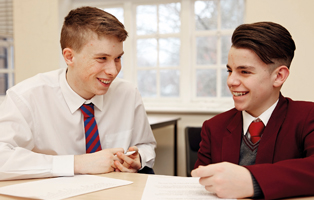
Independent schools have been connecting with their local communities and collaborating with state schools for many years, but it is only in recent years that we have begun to collect data which clearly demonstrates this.
A certain amount of political interest has been generated in connection with charitable status debates over the years and the media often berates fee-charging schools for the ‘tax breaks’ that come with charitable status. In fact, the allocation of bursary awards far exceeds business rates relief granted to those schools which are charities. Even schools that are not charities have taken steps to improve accessibility for families who might not otherwise be able to afford independent school fees, by providing increasing amounts of bursary assistance in recent years.
In 2021, £455 million was provided in means-tested fee assistance for pupils at ISC schools.
A judicial review in 2011 ruled that education is of itself a charitable activity. The trustees of schools that are charities have a duty to report to the Charity Commission their school’s work for the public benefit. This work can take many forms, including: awarding bursaries on a means-tested basis for disadvantaged children, children on the edge of care and looked-after children; and support for academies and collaborative work that provides a variety of learning and development opportunities to children who would otherwise miss out.
It is important that trustees retain flexibility to fulfil any school’s public benefit activity according to local needs and in ways that are appropriate to the capacity and capability of the school. For example, many schools do not have extensive facilities that can be shared with state schools and there are geographic and other barriers to be considered.
The Schools Together website – www.schoolstogether.org – which details many excellent partnership projects between independent and state schools, was built with the express purpose of encouraging, showcasing and inspiring partnership working.
The website was launched in 2016 and although involvement is voluntary, almost 5,000 projects have been displayed, showing a wide range of partnership activities.
The projects are allocated categories such as academic, combined cadet force (CCF), drama, governance, music, sponsorship, sport and design technology.
It is clear from the website that many different types of collaborations are underway involving both large and smaller schools.
From full academy sponsorship, such as Harris Westminster and the London Academy of Excellence, through to arts and craft projects with local primary and special schools; from careers guidance and university preparation, to inclusion in dramatic productions and sports tournaments – this website draws together a range of impressive and exciting educational opportunities for all pupils and staff involved. It showcases excellent examples of what is already in place, providing insight into the value of collaboration.
There are economies of scale and various mutual benefits when schools join together to procure services – including the sharing of specialist teachers – and training. A visiting author or speaker can be made available to a range of pupils beyond the host school. Schools can share specific expertise and develop policies.
Vulnerable subjects, such as modern foreign languages, Latin, music and physics are supported by partnership work. Pupils meeting each other can develop a new way of seeing the world. Inter-school visits can allow new subject areas, sports, musical instruments and experiences to be shared, broadening the horizons of all taking part.
Successful partnerships help to bring communities together in deeper understanding and thereby support social cohesion. The pooling of resources enhances the overall educational offer for all schools involved and by sharing experiences, teachers can benefit from effective professional development. Some schools are working in pairs or small clusters and others are working in large collaborative groups across an area such as in York or Birmingham. These groupings develop projects over time and forge strong links across the communities involved. The projects grow according to schools’ needs and strengths, building mutually supportive communities.
Almost all ISC schools are engaged in partnership activities. Most are involved in sporting and academic partnerships of some kind and around half are engaged in music and drama partnerships. This is alongside the community work and charitable giving that our schools support.
The ISC Census for 2020 showed 1,169 independent schools were involved in partnerships with state schools and the community. Tens of thousands of state and independent school pupils benefit from these partnerships. During the COVID-19 pandemic, restrictions meant that schools had to pause many or all parts of their state school partnership programmes but we expect this work to continue to grow and partnerships to thrive once conditions allow again.
Subscribe / latest articles and news from our schools